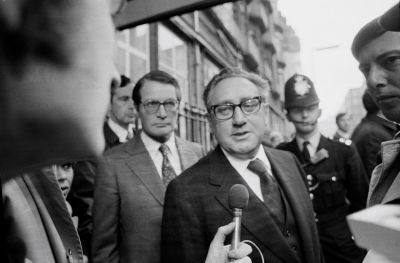Henry Kissinger turns 100. What I remember working under Nixon

Henry Kissinger, the diplomat who served as foreign policy advisor to both presidents Richard Nixon and Gerald Ford, turns 100 on May 27. Admired by some, hated by others, he is still active on the global scene.
“At Bilderberg’s bigwig bash two things are guaranteed: Kissinger and secrecy” read a headline May 20. The Bilderberg group consists of some of the world’s most powerful and wealthy people. Some globe-watchers believe the Bilderbergers and the World Economic Forum (WEF) are out to gain global control through the formation of a one world government.
Kissinger, who, with his Jewish family left Germany in 1938 as the Nazis launched the Holocaust, is a convinced realist. It was that philosophy that Nixon and others respected. “In the end peace can be achieved only by hegemony or by balance of power,” Kissinger believed.
“Hegemony” is the domination of a region or the world itself by the strongest military power. Thus, Kissinger embraced the belief of philosopher Emanuel Kant that “perpetual peace would eventually come … by human insight or conflicts and catastrophe of such magnitude that left humanity no other choice.” Kissinger believed that the world “is now at that juncture.”
Kissinger brought that hardcore view into his negotiations with Vietnam for the end of that war, and with the Soviet Union in the strategic arms limitation talks (SALT), as well the Middle East in 1973.
Kissinger has critics on the Left and Right. Some left-wingers believe he supported an intensely aggressive strategy in Vietnam while some right-wingers believe he advocates a one-world government.
The starkly realistic Kissinger means he is both secularist and pragmatist. Nixon, however, clung to memories of the strong religious teaching he had experienced from his grandmother and mother. Nixon and Kissinger worked hard to bring about détente between the United States and China. Nixon, the intense anti-communist, surprised the world by announcing that he would travel to China and meet Chairman Mao and other leaders there. Kissinger had played a key role in initiating contact with the Chinese.
A week before the trip, Nixon senior aide Harry Dent came into my office at the White House with a stunning request. The president wanted us to try to mobilize a national prayer effort for the success of the Chinese trip and its meetings. At the top of Nixon’s goals was getting Chinese help to end the Vietnam war and freeing American POWs.
Prayer may not have been a priority for Kissinger, but it was for Nixon. There came that ironic moment when Kissinger actually found himself on his knees, praying with Nixon, a man for whom he had previously had contempt.
That night was in summer, 1974. By then Kissinger had actually come to feel a liking for Nixon. The embattled President told Kissinger that he had just informed congressional leadership that he was going to resign the presidency because of the Watergate scandal.
Suddenly, tears puddled in Kissinger’s eyes. He tried to encourage Nixon, telling him that history would remember him well. But now Nixon began to weep also. Kissinger started to leave the room, but Nixon wanted him to stay. The two powerful men remained there for more than an hour. Finally, Kissinger went for the elevator. Nixon held him back, and actually asked Kissinger to pray with him. “Henry. You are not a very Orthodox Jew,” said the President, and I am not an Orthodox Quaker, but we need to pray.”
The two men knelt together that bitter night, and Henry Kissinger found himself in a prayer meeting with the president of the United States.
Some thought Kissinger had an impish personality, and I had a glimpse of that one day when I took two old friends from outside Washington on a private tour of the White House, including the Oval Office since the President was out of town.
To get to the West Wing we had to cross an outside passageway and go around a corner of the building where Henry Kissinger’s office was located. My friends were a man and his beautiful wife. As we passed Kissinger’s office, we saw that he was standing behind a full-length window that was closed. My friend’s wife began to laugh and get jittery as we saw Kissinger standing in the window. He was talking on the telephone to Nixon or Mao, for all we knew, when I read his lips: “Hold for a moment,” he told the person on the other end of the line.
And with that, Henry Kissinger blew a kiss to my friend’s wife. We all joined in the laughter — even Kissinger.
Of course, the lady did not feel the kiss. It was ephemeral. And all these years later, so is Henry Kissinger’s vision for world peace. But, like him or not, at 100, he still pursues it.
Wallace B. Henley is a former pastor, daily newspaper editor, White House and Congressional aide. He served 18 years as a teaching pastor at Houston's Second Baptist Church. Henley is author or co-author of more than 25 books, including God and Churchill, co-authored with Sir Winston Churchill's great grandson, Jonathan Sandys. Henley's latest book is Who will rule the coming 'gods'? The looming spiritual crisis of artificial intelligence.



























